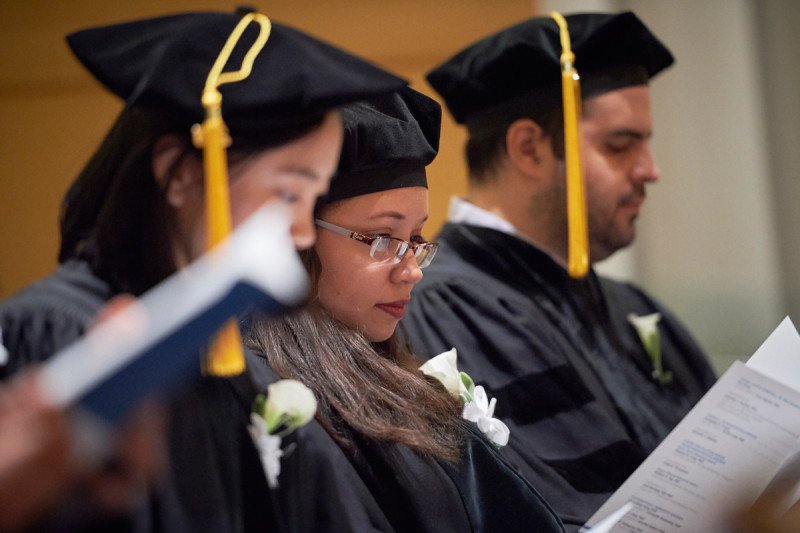
From the left, GSK Graduates Leili Ran, Cindy Puente, and Oakley Olson.
An afternoon ceremony on May 19 celebrated MSK’s 37th annual Convocation and the fifth Louis V. Gerstner Graduate School of Biomedical Sciences Commencement. Presided over by MSK President and CEO Craig Thompson, it recognized students who conducted their doctoral dissertation work in MSK laboratories through a partnership between Weill Cornell Medical College and the Sloan Kettering Institute. In addition, 12 students of the Louis V. Gerstner, Jr. Graduate School of Biomedical Sciences (GSK) received their PhD degrees, bringing the total number of GSK graduates to 37.
Younger MSK physicians, scientists, and postdoctoral research fellows, as well as established clinicians from the institution and beyond, were also recognized.
A Cancer Biologist Speaks of Challenges and Opportunities
Joan Brugge, Director of the Ludwig Center at Harvard Medical School, was presented with an honorary doctorate of science degree as well as the Memorial Sloan Kettering Medal for Outstanding Contributions to Biomedical Science. Dr. Brugge, a pioneer in the field of cancer biology, has devoted her career to proving how disturbances in normal cellular processes give rise to cancer.
She also delivered the Commencement address, offering practical lessons gleaned from her years of research to serve the new graduates in their postdoctoral and working years ahead. “The best predictor of success for our young scientists is their ability to think independently,” she said. “It’s really important to force yourself to synthesize new ideas from existing information, to challenge the prevailing notions. This is the type of thinking that is essential for breaking through existing barriers and for making sense out of unexpected findings.”
She spoke to the array of advances in cancer therapy today and their potential to transform the future of the disease, while acknowledging current limitations. “This is the challenge to graduates today, to find more-effective and longer-lasting treatments that outwit tumor cells’ most clever ways of escaping our precision designer drugs.”
Dr. Brugge closed by encouraging the graduates to not let their perceptions of their own ability dictate their fate as scientists. “You can’t predict your own potential,” she said. She also reassured them that balancing work, family, and friends is truly attainable. “A lot of people argue that one of these has to be eliminated in order to be a successful scientist, that you can’t have all three,” she said. “I would counter that it is absolutely essential to include all of these things as components of your life in order to have the right equilibrium, to put things in perspective, and to break away from the intensity of work.”
A GSK Student Speaks of Lessons Learned
Robert Lyle Bowman, a member of the 2016 GSK graduating class, was valedictorian and gave remarks on behalf of his classmates. Reflecting on his experience at GSK he observed that deadlines and often tedious work were not the romantic notions of scientific discovery that brought him to graduate school. However, he said, “Through my time at GSK I’ve conceived a deep, profound love and respect for science, even when it hasn’t loved me back.”
Characterizing science as often having “a fickle character,” with experiments not always working out as one planned, the newly minted Dr. Bowman said that “the essential role this struggle plays in our development as scientists is only appreciated once you have emerged through an intense period of scientific inquiry.”
“As we look back, I believe we’ll see that the skills that got us into graduate school are unlikely to be the ones that carried us through our PhDs,” he observed.“And, unsurprisingly, the skills we gained here won’t be the only ones we’ll need in the next stage of our careers. We shouldn’t be afraid to reinvent our skill sets, reinvent our interests, and reinvent ourselves completely as members of the scientific community. I believe our time here at Memorial Sloan Kettering has prepared us for this inevitable reinvention. I’m sincerely grateful for the training I have received here and will be forever proud of what we’ve all accomplished.”
MSK Honors Its Own
MSK postdoctoral research fellow Nicholas Arpaia, the recipient of the Tri-Institutional Breakout Prize for Junior Investigators, was also honored at the ceremony. Charles Sawyers, Chair of MSK’s Human Oncology and Pathogenesis Program, along with Cornelia Bargmann of the Rockefeller University and Lewis Cantley of Weill Cornell Medical College, established the prize to recognize and encourage young scientists at the outset of their careers. Each of these scientists received a 2013 Breakthrough Prize for Life Sciences and decided to contribute part of their winnings to establish the annual award.
Gerald Soff, Chief of MSK’s Hematology Service, was recognized as well with the Willet F. Whitmore Award for Clinical Excellence.